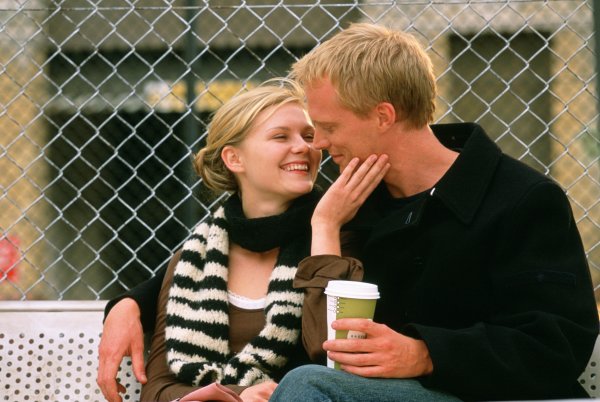Movie review by Greg Carlson
As sports comedies go, “Wimbledon” looks like a champ next to most of its competition. More often than not, it rises above the requisite clichés with reasonably believable dialogue and two terrific lead performers in Paul Bettany and Kirsten Dunst. The film follows the template developed in contemporary British films like “Four Weddings and a Funeral” and “Notting Hill,” in which proper gentlemen are thunderstruck by dazzling, brash American women. That said, director Richard Loncraine (who also helmed the incredible alternate-history version of “Richard III” with Ian McKellen) works overtime to sidestep most of the script’s shortcomings, which tend to be composed of dozens of familiar tricks.
Bettany plays fading tennis pro Peter Colt. At one time ranked 11th in the world, Colt enters the Wimbledon tournament unseeded, and win or lose, he has decided to zip up his racket at the end of his run. Dunst’s Lizzie Bradbury is the diametric opposite of Colt on the court. Young, energetic, and focused, her star is on the rise. Following a hotel room mix up, in which Peter accidentally surprises the unembarrassed Lizzie while she takes a shower, the two discover a mutual attraction that leads to some pre-game canoodling. Lizzie’s father, the hard-edged Dennis (Sam Neill), dislikes distractions to his daughter’s game, and tells Peter to beat it.
Bettany plays Peter with enough self doubt that we would not be at all shocked if he heeded the warnings of Dennis, but Lizzie, being equally hot and aggressive, pursues the affair. Following the demands of the screenplay, the sex invigorates Peter’s on-court performance, and he finds himself advancing through the rounds even as Lizzie begins to falter. This reversal of fortune sets up the majority of the movie’s dramatic conflict, which never works up as much sweat as Peter does during his matches.
Bettany fares better in the dialogue department than Dunst, but not by much. Whenever he is on the court, a truly unnecessary, annoying voiceover narrates the confusion bouncing around in his head. Bettany is accomplished enough to save the technique from being a total disaster, but the movie would have been much stronger without the interior monologue. Bettany manages his role so nicely, he can add romantic comedy to his already impressive roster of cinematic strengths. His performances in “Master and Commander” and “Dogville” showed much greater range, but there is no doubt that his play in “Wimbledon” will win him an even larger base of admirers.
The supporting players, including Bernard Hill and Eleanor Bron as Peter’s parents and Jon Favreau as an oily sports agent, are effectively employed, despite the obviousness of their inclusion as fluffy subplots. The film also manages to depict the Wimbledon tournament with cinematic flair: the filmmakers had permission to shoot at the All England Lawn Tennis and Croquet Club during the actual competition, and Darius Khondji’s photography captures the speed and excitement of the game. Perhaps the most disappointing element of “Wimbledon” is the character of Lizzie, who should have been given more of the kind of material that makes Peter three dimensional. Dunst is ready to volley, but the writing double-faults. Even so, “Wimbledon” remains pleasant and entertaining through match point.
